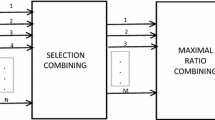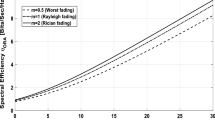Abstract
In this paper we derive closed-form expressions for the single-user adaptive capacity of generalized selection combining (GSC) system, taking into account the effect of imperfect channel estimation at the receiver. The channel considered is a slowly varying spatially independent flat Rayleigh fading channel. The complex channel estimate and the actual channel are modelled as jointly Gaussian random variables with a correlation that depends on the estimation quality. Three adaptive transmission schemes are analyzed: (1) optimal power and rate adaptation; and (2) constant power with optimal rate adaptation, and (3) channel inversion with fixed rate. In addition to deriving an exact expression for the capacity of the aforementioned adaptive schemes, we analyze the impact of channel estimation error on the capacity statistics and the symbol error rate for GSC systems. The capacity statistics derived in this paper are the moment generating function, complementary cumulative distribution function and probability density function for arbitrary number of receive antennas. Moreover, exact closed-form expressions for M-PAM/PSK/QAM employing GSC are derived. As expected, the channel estimation error has a significant impact on the system performance.
Similar content being viewed by others
References
Proakis J. G. (1995) Digital communications (3rd ed.). McGraw, New York
Stüber G. L. (1996) Principles of mobile communications. Kluwar, Norwell, MA
Jakes W. C. (1994) Micro wave mobile communication, 2ed Piscataway. IEEE Press, New York
Gans M. J. (1971) The effect of Gaussian error in maximal ratio cominaters. IEEE Transactions on Communication Technology COM-19(4): 492–500
Aghamohammadi A., Meyr H. (1990) On the error probablity of linearly modulated singals on Rayleigh frequancy-flat fading channels. IEEE Transactions on communications 38(11): 1966–1970
Dong, X., & Beaulieu, N. C. (2003). SER of two-dimensional signaling in Rayleigh fading with channel estimation error. In Proceedings of international conference on communication (ICC), Anchorage, AK, pp. 2763–2767.
Annamalali A. Jr. (2001) The effect of Gaussian error in selection diveristy combiners. Wireless Communications and Mobile Computing 1: 419–439
Annamalali A., Tellambura C. (2002) Analysis of hybrid selection/maximal-ratio diversity with Gaussian errors. EEE Transactions on Communications 1(3): 498–511
Ma, Y., Zhang, D., & Schober, R. (2005). Effect of channel estimation errors on M-QAM with GSC diversity in fading channels. In Proceddings of IEEE International Conference on Communications. Seoul, Korea, pp. 2190–2194.
Shannon C. E. (1948) A mathematical theory of communication. Bell System Technical Journal 27: 397–423
Fochini G., Gans M. (1998) On limits of wireless communications in a fading environment when using multiple antennas. Wireless Personal Communications 6–3: 311–335
Goldsmith A.J., Varaiya P. (1997) Capacity of Rayleigh fading Channel with channel side information. IEEE Transactions on Information Theory 43(6): 1986–1992
Alouini M.-S., Goldsmith A. J. (1999) Capacity of Rayleigh fading channel under different adaptive transmission and diversity combining techniques. IEEE Transactions Vehicular Technology 47(4): 488–492
Bhaskar V. (2007) Spectral efficiency evaluation for MRC diversity schemes over generalized Rician fading channels. International Journal of Wireless Information Networks 14(3): 209–223
Mallik R.K., Win M.Z., Shao J.W., Alouini M.S., Goldmsith A.J. (2004) Channel capacity of adaptive transmission with maximal ratio combining in correlated Rayeigh fading. IEEE Transactions on Wireless Communications 13(4): 1124–1133
Dohelr M., Aghvami H. (2005) On the approximation of MIMO capacity. EEE Transactions on Wireless Communications 4(1): 30–34
Gradshteyn I. S., Ryzhik I. M. (2000) Tables of Intergrals, serious and Products. Acadamic Press, San Diago
Author information
Authors and Affiliations
Corresponding author
Rights and permissions
About this article
Cite this article
Al-Qahtani, F.S., Gurung, A.K., Zummo, S.A. et al. Performance Evaluation of Generalized Selection Combiners Over Slow Fading with Estimation Errors. Wireless Pers Commun 56, 207–236 (2011). https://doi.org/10.1007/s11277-009-9829-6
Published:
Issue Date:
DOI: https://doi.org/10.1007/s11277-009-9829-6




